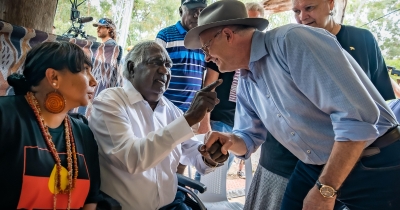Accessibility Tools
- Content scaling 100%
- Font size 100%
- Line height 100%
- Letter spacing 100%
Yunupingu
The ABR Podcast
Released every Thursday, the ABR podcast features our finest reviews, poetry, fiction, interviews, and commentary.
Subscribe via iTunes, Stitcher, Google, or Spotify, or search for ‘The ABR Podcast’ on your favourite podcast app.
The red thread: Xi Jinping’s ideology of power
by Neil Thomas
This week on The ABR Podcast, Neil Thomas reviews On Xi Jinping: How Xi’s Marxist Nationalism is shaping China and the world by Kevin Rudd. Thomas explains that even China watchers find it hard to be clear on the thoughts and plans of the leader of the Chinese Communist Party. They disagree, he tells us, on basic, critical questions, such as for how long Xi will rule. ‘Enter Kevin Rudd’, Thomas writes. ‘In his latest book, former prime minister Kevin Rudd adds a worthy new chapter to his life of public service, digesting thousands of pages of “Xi Jinping Thought” so that you do not have to’. Neil Thomas is a Fellow on Chinese Politics at Asia Society Policy Institute’s Center for China Analysis in Washington DC. Here is Neil Thomas with 'The red thread: Xi Jinping's ideology of power' by Neil Thomas, published in the December issue of ABR.
Recent episodes:
In this week’s ABR Podcast, Desmond Manderson takes us back sixty years to the 1963 Yirrkala Bark Petition drafted by Yolngu leader Yunupingu. The Yirrkala petition called for constitutional recognition of Indigenous rights and can be seen as an antecedent to the Uluru Statement from the Heart. Desmond Manderson is Director of the Centre for Law, Arts and Humanities at the Australian National University. Here he is with ‘Yunupingu’s song: Constitutions as acts of vision, not of division’, published in the September issue of ABR.
... (read more)From the age of fifteen until his recent death at the age of seventy-four, the great Yolngu leader Yunupingu (1948–2023) was at the forefront of the struggle to change the Australian legal system in unprecedented ways. In 1963, with his father, Mungurrawuy, he drafted the Yirrkala Bark Petition, which presented to Parliament an eloquent claim for the rights of the Indigenous peoples of Arnhem Land before their country was, without their consent, turned into a bauxite mine. The Bark Petition was no ordinary document. On the one hand, it uses the antiquated language of a traditional ‘humble petition’ to Parliament, concluding in forms of speech that have hardly changed since the seventeenth century: ‘And your petitioners as in duty bound will ever pray.’
... (read more)


